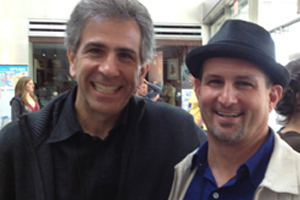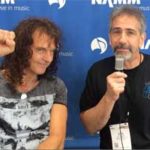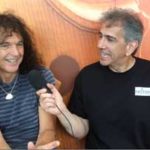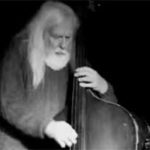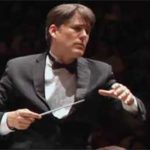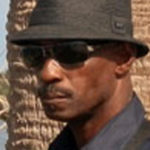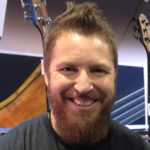Oberlin’s bassmaster shares his worldly insights and offers advice for playing jazz, classical and more!
Exclusive interview with FBPO’s Jon Liebman
February 1, 2010
Peter Dominguez is a double bassist, well versed in both classical and jazz. He has played alongside Marcus Belgrave, Gene Bertoncini, Benny Carter, Tommy Flanagan, Billy Hart, Jon Hendricks, J.J. Johnson, John Lewis, Mark Murphy, Claudio Roditi, Woody Shaw, Ira Sullivan and Don Thompson.
He has also performed as a solo artist with the Fontana Chamber Players, Miami String Quartet, Renaud Chamber Orchestra and the Los Angeles Piano Quartet. A former faculty member of the Michigan State University School of Music, Peter is currently professor of Double Bass and Jazz Studies at Oberlin University. Peter’s CD, How About This, was released in 2009.
FBPO: Let’s talk about your musical upbringing. I understand your dad was a piano player and singer. Did he inspire you to study music or was it just expected?
PD: I remember first being inspired by my father Francisco “Frank” Dominguez – Frank Demiles is his professional name – in a choir loft. His clear tenor voice soared above the choir and organ and reverberated throughout the church. It was awesome! I think I was around 4 or 5 yrs old and hearing his heart through my ears was an awakening.
Early lessons soon began on piano and clarinet followed sometime later. Dad always sang with the family, especially in the car on trips. I have many siblings and we all played instruments, so singing and playing – piano, drums, violins, basses, cello, flute, clarinet – was a daily ritual. I remember a house party where Dad’s trio was playing in the living room. I’m standing in my pajamas in front of Al Washington as he unpacks his double bass. Who knew then that I would be the bassist in the Frank Demiles trio by the time I was 16? I played with Dad – as Peter Demiles – for the next five years, learning the standards by ear and playing with the elders while going to Hamilton High School and University of Wisconsin-Madison. The only expectation was that if you didn’t know a tune, you’d better know it the next time. Dad continues to be an inspiration to play with.
FBPO: When I think of some the great jazz meccas in the U.S., I don’t automatically think of Milwaukee at first. Should I? What kind of music scene existed there when you were growing up? What kind of opportunities does that city provide for musicians?
PD: It was natural for me to absorb several scenes in Milwaukee. I was playing professionally with Dad, along with Joe Zarcone, Haddish Alexander, Kaye Berrigan, Baltimore Bordeaux and Luis Martinez. I was playing bass in orchestras and jazz ensembles and singing in the public schools, which were rich in talent and programs. I was playing bass in Music for Youth and jamming rock and blues on the electric bass with friends.
Ken Schermerhorn and the Milwaukee Symphony were thriving and I got the chance to meet Roger Ruggeri and several other section players, including Dave Phillips, Laura Synder and Larry Epstein. I also knew jazz bassists Carmen Weathers, Dick Elliott, Mitchell Covic and Skip Crumby-Bey. Dad took me around town and introduced me to guitarist George Pritchett and pianist Buddy Montgomery. I began hanging around “Sweetbottom” with the Stermers brothers and “Matrix” with John Harmon and Fred Sturm. I was in the last incarnation of “Montage Project” with Tom Sandquist and Bob Rebholz. My contemporaries were Jeff Chambers, Brian Lynch, David Hazeltine, Gerald Cannon and Carl Allen. Yes, I guess you wouldn’t think of Milwaukee as a jazz mecca, but the talent was there. Something in the water – or maybe it was the oleo!
Also see our exclusive FBPO interviews with Richard Davis
and Tom Knific, both of whom are mentioned here:
[table id=70 /]
FBPO: I remember talking with you about Richard Davis way back when. How did he influence you?
PD: I was at the University of Wisconsin-Madison in 1977 when Richard Davis joined the faculty and became my teacher. I had been studying bass with Roger Ruggeri and jazz with Jimmy Cheatham. Prior to Richard’s arrival, Jimmy had turned me on to his Philosophy of the Spiritual album and his amazing interdisciplinary approach to the double bass. Richard kicked my butt and transformed me in many ways. At first, whenever I felt unsure of his direction, I would put on a recording of him with either Eric Dolphy or the Thad Jones/Mel Lewis band. That would snap it all back into perspective and get me motivated to work harder. I was his teaching assistant from 1980-82. We joke now that he taught me about the street and I taught him about the academy! He remains a close confidant and mentor. We started the Richard Davis Foundation for the Young Bassist, Inc., in 1993 and I have been organizing our annual conferences at UW-Madison. We typically have about 75 student bassists and 15 clinicians. I’m very fortunate to have had Richards’ guidance and wisdom all these years.
FBPO: How about Lucas Drew?
PD: I first studied with Dr. Lucas Drew at a National String Workshop. Whereas Richard drew my voice out and gave me confidence, Lucas refined my voice and provided strategies for nuance. Besides being a kind gentleman, Lucas has always been a player that knows the methodology and is a master teacher. I became his teaching assistant at the University of Miami-Coral Gables in 1982, while pursuing a Doctor of Musical Arts in Classical Double Bass. Besides teaching classical bass and orchestra repertoire class, I spent a good amount of time in the jazz department, teaching electric bass for Don Coffman and playing with pianists Ron Miller and Vince Maggio. The jazz pedagogy and improvisation classes were invaluable. Many doors opened for me in Miami without the biases that usually occur when someone crosses over styles. Lucas helped me elevate my playing to the point where I could navigate the stylistic issues. I played with Lucas in the Miami Chamber Symphony, the Orchestra of Miami and the Boca Raton Symphony. One of my last successful auditions was for the Florida Philharmonic. I also met and played concerts with Ira Sullivan, Eddie Higgins, Tommy Flanagan, Mark Murphy, Paquito D’Rivera and Bobby McFerrin.
FBPO: Tell me about your experience at Michigan State University? How much of a Jazz Studies program existed when you got there in 1984 and what was it like when you left in 1996?
PD: MSU provided an enormous opportunity for me and proved beneficial in many ways. I chose MSU instead of the Florida Philharmonic and became the Assistant Professor of Double Bass and Jazz. I taught classical and jazz bass, improvisation and small ensembles and started a jazz forum class. I also performed in the MSU Faculty Jazz Trio and was Principal Bass of the Greater Lansing Symphony Orchestra.
My move to Michigan afforded me many opportunities, including continued studies with Bob Gladstone, then-principal double bassist with Detroit Symphony Orchestra, substitute section work with the DSO and exposure to the Detroit jazz scene, where I got to play with a lot of talented artists. My MSU music chairperson said I gave the department a “Metropolitan” look. Imagine that! When funds became available, I authored and administrated state and national grants that brought minority faculty, including pianist Eddie Russ, saxophonist Donald Walden, trumpeter Marcus Belgrave, trombonist Sherm Mitchell and percussionist Francisco Ali Mora into the jazz department.
In 1992, becoming chair of the string department was added to my duties and, with that, the opportunity to hire teaching assistants and an adjunct teacher. Saxophonist Andrew Speight came from Australia and became a jazz TA. Rodney Whitaker became the jazz bass adjunct teacher. And the rest is history! Before I left in 1996, I helped develop “MSU Jazz Presents” and am proud to have presented bassists Ron Carter (twice), Gary Karr, Bob Gladstone, Marion Hayden, Marc Johnson, Richard Davis, Scott Haigh, Edgar Meyer, Tom Knific and Milt Hinton in lectures and performances.
FBPO: What about Oberlin? What can a serious, diligent student expect to get out of the music program there?
PD: Oberlin is a special place with a high concentration of talent and intellect. The faculty is experienced with professionals and committed to masterful teaching. Nurturing one’s voice while developing vocabulary and repertoire is something you could expect. I’ve witnessed many transformations and continue to challenge and nurture a talented studio. For bassists, Oberlin has opportunities to perform in as many styles as you commit to work on and pass the audition.
FBPO: Do you have any “professorial mantras” you try to drill into your bass students? Maybe something about playing in tune, grooving, soloing, phrasing…?
PD: Yes. Here are a few:
- Get a sound, find a groove, practice pitch, know the music, play from your heart
- Imitate, emulate, represent, re-create, interpret, interpolate, extrapolate
- Create with swing, emotion, precision and conviction
- Let the MUSIC play you.
- Command the bass through the string
- No lifting of string or movement of bass when shifting
- Read music to connect eyes to hands; hear music to connect ears to hands. Prepare both ways. Set performance standard for both.
FBPO: What advice do you give your students about choosing a career in music? On the one hand, they need to develop their passion for the music, yet, on the other hand, they need to be prepared to make a living. How do you help them find that balance?
PD: I tell them they have chosen to pursue the lifestyles of the Wise & Obscure, as opposed to the Rich & Famous! I don’t recruit or recommend anyone that doesn’t have the passion 24/7. They also must possess the talent and develop the perseverance of a professional musician, including 10-15 years of performance practice. It’s a struggle so important to artistic content. One also needs to continually seek out people and venues to perform. That’s where the love is. Despite this economy and climate, I believe there are engaged communities that support musical industry and growth. One just needs to think more globally, like the enclave of Oberlin grads working in Shanghai, China.
FBPO: You’ve been an educator for a long time, but you’ve also had a stellar career performing with some of the biggest names in jazz, including Benny Carter, Tommy Flanagan, Woody Shaw and so many others. What were some of the more meaningful or memorable gigs you’ve done?
PD: The European tours as principal double bass with the American Sinfonietta from 1991 to 2001 were memorable: great players, music, venues, museums and churches in the urban centers of Germany and Austria. Most notable was a 1994 concert with guitarist Pepe Romero in Musikverein, Vienna, Austria. Traveling to Russia in 2005 with pianist Ruth Laredo and being treated like royalty was also a great experience. I performed solo and chamber music in Glazunov Hall in St. Petersburg, Russia, with the St. Petersburg Quartet. I also conducted a Master Class at the St. Petersburg Conservatory. Spending a day at the Hermitage museum was incredible!
Most recently I visited Santiago, Chile, and taught a workshop at the University of Chile. Professor Alejandra SantaCruz has an exceptional studio and I plan to go back in the near future.
On the jazz side, I played with Billy Hart, Wyclef Gordon, Gary Bartz and Sullivan Fortner at Dizzy’s Club Coca Cola in “Jazz at Lincoln Center” last January. Many other great venues have included Baker’s Keyboard Lounge in Detroit, The Cleveland Bop Stop and Rusty’s in Toledo. Concerts and gigs with Della Reese, Ira Sullivan, Louis Smith, Larry Nozero, J.J. Johnson, Patti Richards, Marcus Belgrave, Mark Murphy, Dan Wall – all with great stories along with incredible music.
FBPO: We’ll have to cover some of those stories in the next interview! In the meantime, how would you describe your new CD, How About This?
PD: It could be categorized in the “jazz piano” trio tradition, with something for the bass player. “A collection of tunes old and new, bowed & blue” – How’s that for a byline! It’s all about the process for me and I think the recording represents good tunes, great ensemble, and inspired soloing. Bringing in James Farber to record the session and playing with Billy Hart and Rick Germanson were dreams come true. I’m anxious to hear how the listener will describe it.
FBPO: You’ve already accomplished so much in your career. What lies ahead for Peter Dominguez? What would you like to achieve that you haven’t done yet?
PD: Lately I’ve been dealing with some health issues. You don’t play for 40 years without some wear and tear on the body. But the good news is that things are on the mend. I’m working on my website and hope to publish some lesson sheets and improvisation exercises, probably during my next sabbatical. I’m hoping to get some chops together to do some more playing and a solo recording. I’m always working on repertoire, dabbling in composition and trying to play more piano. Lately I’m discovering the treasures of original sheet music.
This spring I have performances and workshops with guitarist Jack Wilkins and drummer Ron Godale at the Tri-C Jazz Festival in Cleveland, as well as the coordination of seventeenth Richard Davis Foundation for the Young Bassist, Inc., conference in Madison, Wisconsin.
FBPO: What do you like to do that’s not necessarily musically oriented?
In May, after our semester ends, there is usually an urge to do something with my hands – a carpentry project or home repair. We have a century home in Avon Lake, so there’s always something to fix. I remain active by swimming, bicycling and doing yoga. I also have an interest in the healing arts, like acupuncture, massage, and chiropractic care.
